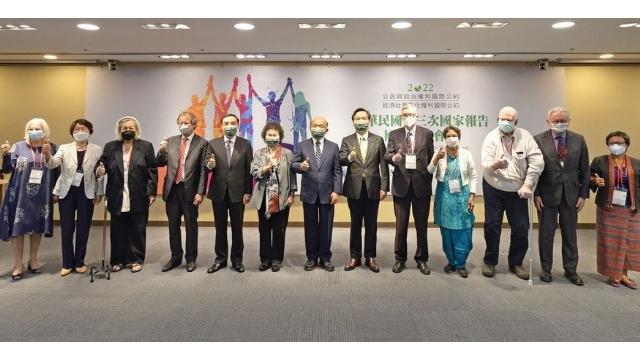In 2009, Taiwan incorporated the two human rights Covenants into its domestic law. On May 9–13 an international commission assessed their implementation—but some aspects were missing.
by Massimo Introvigne

The International Covenant on Civil and Political Rights (ICCPR) and the International Covenant on Economic, Social and Cultural Rights (ICESCR) became international law in 1976, and are the cornerstones of the United Nations human rights system. Taiwan is not a member state of the United Nations, but in 2009 incorporated the two Covenants into its domestic law. On May 9–13, 2022, the 3rd International Review Conference on the National Reports of the Two Covenants was held at the Chang Rong-Fa Foundation’s International Conference Center. It was the first such review since the National Human Rights Commission was established in 2020.
In 2011, Taiwan’s government initiated the process of preparing initial reports on the rights contained in both Covenants, and in 2013, an independent Review Committee with experts from nine different countries was invited to review these reports in light of information from all available sources, including civil society. On 1 March 2013, the group adopted a set of Concluding Observations and Recommendations.
In 2016, the Government prepared a detailed Response to the Concluding Observations and Recommendations, along with Second Reports on both Covenants and a Common Core Document forming part of the Reports. On the invitation of the Government these reports were subjected to review in Taipei from 16 to 20 January 2017 by a Review Committee consisting of ten independent experts. On 20 January 2017, the Review Committee adopted a second set of Concluding Observations and Recommendations.
In June 2020, the Government prepared a Response to the 2017 Concluding Observations and Recommendations, along with Third Reports on both Covenants and a Common Core Document forming part of the Reports. Because of travel restrictions related to the COVID-19 pandemic, the invitation to a review in Taipei had to be postponed on several occasions. From 9 to 13 May 2022, the reports were subjected to review in Taipei by a Review Committee consisting of nine independent experts.
The Committee divided itself into two groups, one dealing with the ICCPR, chaired by Manfred Nowak, an Austrian human rights lawyer, who served as the United Nations Special Rapporteur on Torture from 2004 to 2010, and one with the ICESCR, chaired by Eibe Riedel, a retired German academic who was a member of the United Nations Committee on Economic, Social and Cultural Rights from 2003 to 2012. Both had participated in the process since 2013. On 13 May 2022, the Review Committee adopted a third set of Concluding Observations and Recommendations (COR 3).
While the COR 3 are useful in showing that work remains to be done to fully implement the two Covenants in Taiwan, the absence of any reference to freedom of religion or belief (FORB) and taxpayers’ rights is surprising. As one of the scholars who has studied and lectured extensively on the Tai Ji Men case, I would have expected that both subjects would have been discussed in the COR 3. Time and again, those who have studied the Tai Ji Men case have noted that it is not an isolated incident, and that both FORB and tax justice seem to be problems worth of the most serious consideration when assessing the situation of human rights in Taiwan.
During the five-day discussion, several NGO representatives and scholars pointed out to the above problems and referred to the Tai Ji Men case. Oliver Lee, representative of the U.N. ECOSOC-accredited NGO Association of World Citizens, observed that how the National Human Rights Commission exactly works remains unclear, particularly when confronted with cases involving the National Taxation Bureau and the Administrative Enforcement Agency. In the Tai Ji Men case, a complaint was treated by Commission by simply asking the accused executive branch to prepare a letter and then using that letter to answer the complainants.

Lee also noted that there are other serious tax cases that remain unaddressed by the Commission. A traffic fine of NT$18,000, resulted in a seizure and foreclosure of the offender’s house, valued at NT$2.5 million. A taxpayer was restricted from leaving the country indefinitely and had to remain abroad for nine years, resulting in a divorce. While the Ministry of Finance has subsequently reduced the period of restriction of leaving the country to 5 years, the Administrative Enforcement Agency is still allowed to place residence restrictions on people whose tax debt reached about US $3,500, with no limitation on duration. The Commission should pay more attention to tax injustice, Lee said. It is not a technical problem but a serious violation of human rights and of the two Covenants.
David Lin, a representative of Chung Cheng University’s Economic and Legal Research Center, stated that the number of interpretations of the tax law that have been declared unconstitutional is so high that it evidences a systemic lack of application of the two Covenants. The Taxpayer Protection Act of 2017 created the Taxpayer Protection Officer, but these officers are not really independent as they are tax officers who serve part-time and return to their original positions after two years. In general, the system of bonuses given to tax bureaucrats incentives them to issue ill-founded tax bills and to violate taxpayers’ human rights. It should be deeply reformed or eliminated.
Amending the laws regulating the rights of assembly and to hold peaceful demonstrations has been delayed, and the proposed amendments still give the police a broad scope to deny authorizations. Contrary to what the government reports, such denials are frequent. The laws on disqualifying judges who have already served in previous stages of a case also needs to be amended, Lin said.
Chen Yi-Nan, the founder and an arbitrator of the Tax & Legal Reform League, called the attention of the committee on three major problems in the implementation of the two Covenants. First, taxpayers’ human rights are not guaranteed by a system that allows the tax authorities to maintain the original tax bills indefinitely, even after court decisions have established that they are ill-founded. Dr. L. is a renowned scientist who returned to Taiwan and applied for a patent worth $10 million as the company’s capital, with the approval of the authorities, and was then taxed as if the capital contribution was income. He went bankrupt and lost his patents and business.
Second, freedom of speech and of peaceful protest continues to be unduly restricted. Foreign scholars have commented on the case of Ms. Huang, a protester on the Tai Ji Men tax case, who was detained in 2020 just for holding a sign a bureaucrat regarded as offensive.
Third, despite the government’s claims, the two Covenants still do not play a significant role in court cases. According to the Third Reports on both Covenants and a Common Core Document prepared by the Government, only some 100 cases mentioned them between 2015 and 2019. Clearly, more should be done, Chen said.
Liu Ming-Zhe, a human rights observer at the Association of World Citizens, added that it is extremely unjust and unfair that the citizen’s right to request a tax refund has been subject to a time limit of 15 years, when there was previously no time limit for requesting a tax refund for an incorrect taxation by tax agencies.
Aaron Lee, representative of the Taiwan Association for Financial Criminal Law Study, asked the Committee to investigate the Tai Ji Men case, a blatant and unresolved case of human rights violations on which a significant scholarly literature exists both in Taiwan and internationally. Tai Ji Men is a menpai teaching qigong, martial arts, and self-cultivation whose master, his wife, and two members were detained in 1996, accused of fraud, tax evasion, and even, absurdly, of “raising goblins” by Prosecutor Hou Kuan-Jen. In 2007, the court of third instance recognized them as not guilty of any crime, including tax evasion, and they received national compensation for the unjust detention.

However not only was Prosecutor Hou never punished for his violations of the law in the Tai Ji Men case, but based on his theories that were declared unfounded in 2007, the National Taxation Bureau continued to issue tax bills and finally maintained the one for the year 1992. Based on this bill, in 2020 the National Enforcement Agency auctioned off unsuccessfully and confiscated land intended for a Tai Ji Men self-cultivation center. This generated mass protests. The case includes several egregious violations of human rights and needs to be investigated, Lee said.
Ms. Lynn Lin, another representative of the Tax & Legal Reform League, stated that while the review committee recommended in 2017 that the government strengthen the application of the Covenants in the country, the Ministry of Finance has not actively revised the law to comply with the spirit of the Two Covenants and to protect human rights. In the Interpretation Letter Orders issued in 1961, 1978, and 1979, for example, the original tax bill and the new double-reviewed tax bill issued by the National Taxation Bureau following the review coexist, and the revocation of the original sanction in a subsequent petition or an administrative court decision is a “revocation of the re-examined tax bill,” but does not revoke the “original tax bill.” The consequence is that, even if the taxpayer wins the case several times, the original tax bill remains. Furthermore, provisions on transitional justice only refer to human rights violations perpetrated until November 6, 1992. However, these violations continued even after that date.
While on other fields the COR 3 report contains useful elements, the above comments demonstrate that a discussion about FORB and tax justice that should have been included was missing. In this sense, the event was a missed opportunity.
Source: Bitter Winter

